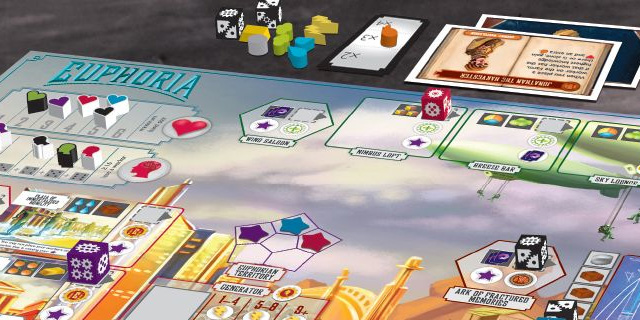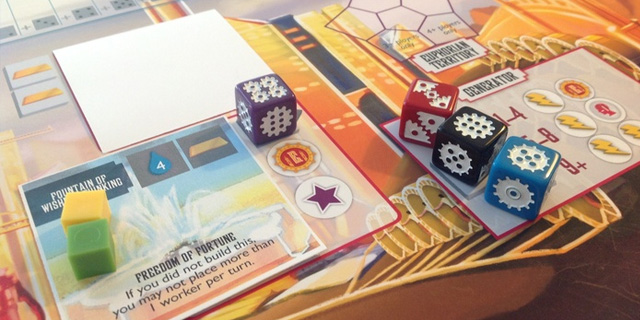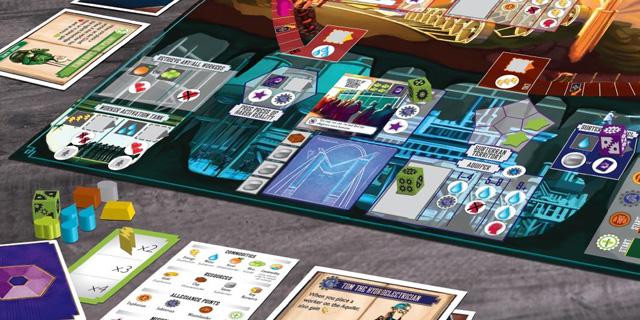
The latest offering from Stonemaier Games, Euphoria: Build a Better Dystopia, is one of those awkward games that is easier to play than it is to teach. While certainly not intentional, it does accidentally tie into the game’s dystopian theme of knowledge being dangerous and carefully controlled. In fact, despite the game’s solid mechanics, Euphoria‘s theme is probably its most defining and memorable feature.
At its core, Euphoria is a worker-placement game. Up to six(!) players each start off with two workers and can activate up to two more, represented by six-sided dice not unlike Alien Frontiers. But unlike any other game of this type, if your workers ever become aware that they are living in a dystopia, one of them might actually abandon you! The knowledge of your workers is their die value, and you roll a die whenever you retrieve or activate it; if the total of your available workers plus your general knowledge score is sixteen or more, you forfeit your highest-valued worker.
On your turn you have a choice of two actions: place a worker or retrieve one or more of your workers. Placing a worker will generate commodities, resources, artifacts or authority (points) depending on where you put it. If you have multiple workers that share the same value, you can place them successively. Workers can bump another worker from certain locations, returning it to its owner (who then rerolls it) without that player having to spend a turn retrieving it.

Retrieving workers can either gain or reduce their morale (your artifact card hand size), depending on whether or not you satiate their needs. Of course you also need to weigh your potential knowledge-related risk against how many workers you want to pull back. It is often correct to leave one or more workers on the board to reduce your risk once you have more than your initial two (or too much knowledge), although if they can be bumped you might get them back anyway.
Your initial play will be sending a worker to one of the four commodity-gathering locations, where they will bring you either electricity, water, food or bliss. The effects of these locations are the only ones dependent on the values of the dice placed there, with the total knowledge of all workers at the location determining the result. You have to plan around not only your own dice, but your opponents’ as well.
Once you have commodities, you gain access to the tunnels. Working in the tunnels can give you either a resource (gold, stone or brick) or an artifact card, but doing so also advances the tunnel’s construction. Resources and artifacts then allow you to construct and eventually visit markets, and markets are the primary method by which you score authority. Once completed, a tunnel also unlocks a special location that will grant three units of food, electricity and/or water in one shot — if you have the proper connections.
You see, each player has one or more recruits representing one of the four factions on the board: Euphorian, Subterran, Wastelander or Icarite. Recruits offer special abilities that will influence your strategy, and having an active recruit of a given faction will provide passive benefits as that faction gains influence. In an interesting twist, something else also happens as factions gain influence or progress their tunnels: at certain thresholds, non-active recruits of that faction become active, granting new abilities to players and shifting strategies.

The other major twist to the game comes from the constructed markets. When a market’s construction is complete, every player who contributed to it gets to place an authority star on it. Every player who doesn’t have a star on a market loses a personal freedom, as one of the rules of the game no longer applies to them. This can prevent you from placing multiple workers, revoke your recruits’ abilities or any number of nasty surprises. You can regain these freedoms by visiting an artifact market, but that could cost you time that you might not have.
The game ends as soon as a player places a tenth authority star somewhere, with that player winning then and there. This “cross the finish line” end condition is by far my least favorite aspect of the game, as it frequently becomes evident that one player is going to win and there isn’t anything the other players can do to really stop them. So the game either limps along to its inevitable conclusion, or is ended prematurely because why bother going through the motions? This is extremely unsatisfying, and I wonder if a point system in which authority stars have different values depending on their placement was ever tested.
Then again, I don’t think I’ve ever played Euphoria as intended. There’s a rule mentioned in an almost throw-away manner that allows players to trade commodities, resources, or artifacts on their turns, but I’ve never used it. This is partially because I forget about it, but also because no other worker-placement game uses trading (that I’m aware of). It feels… unnatural. And not helped by the fact that most games that heavily features trading, like Settlers of Catan, also carry the potential for kingmaking. But that is opposed to king-allowing, I guess? Neither solution feels right to me.

Awkward endgame aside, I really do like every other piece of Euphoria‘s design. Well… maybe not the custom “steampunk” dice, which can be difficult to read at first and doesn’t really fit the dystopian theme, but everything else is excellent. There are interesting choices to make, different strategies influenced by what recruits you have available, a literal ethical dilemma (which either rewards you with a new recruit or a placed authority), a well-integrated theme and a good use for rolling dice without their actual values being all-important. I have fun playing Euphoria, right up to the point when I don’t. Also, the suggested play time of one hour seems to be a lie, but that could just be the game feeling longer to complete.
I hope I can work these issues out. Maybe it’s just me, maybe trading is important, or maybe I just need to house-rule some sort of scoring system. Either way, I still recommend Euphoria and anticipate many more plays in the future. And if I never can get over my frustrations? Well, maybe that’s the most dystopian result of all.
Euphoria: Build a Better Dystopia retails for $70.



















